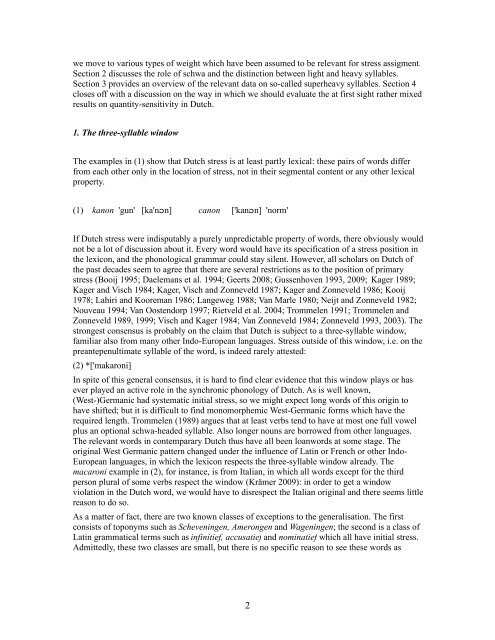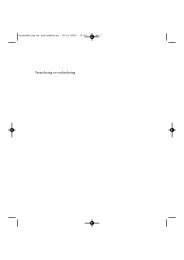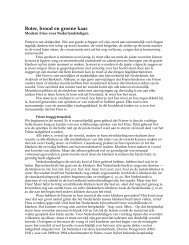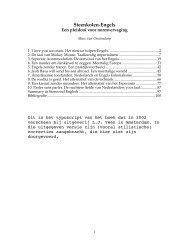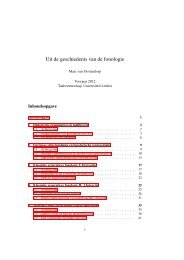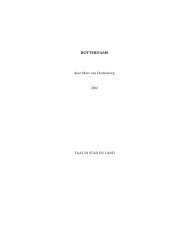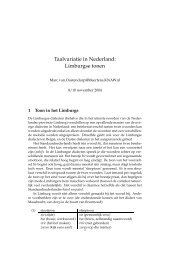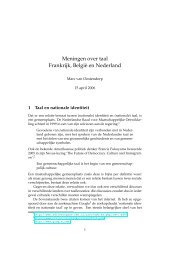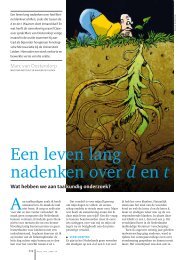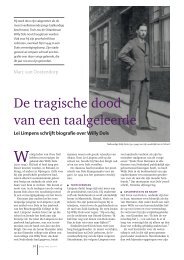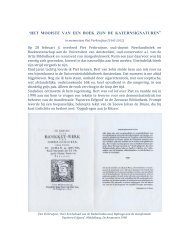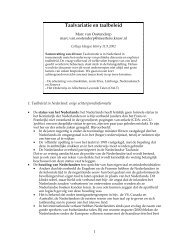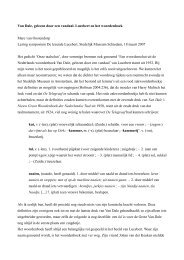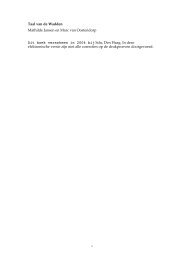Quantity and the three-syllable window in Dutch word stress 0 ...
Quantity and the three-syllable window in Dutch word stress 0 ...
Quantity and the three-syllable window in Dutch word stress 0 ...
Create successful ePaper yourself
Turn your PDF publications into a flip-book with our unique Google optimized e-Paper software.
we move to various types of weight which have been assumed to be relevant for <strong>stress</strong> assigment.<br />
Section 2 discusses <strong>the</strong> role of schwa <strong>and</strong> <strong>the</strong> dist<strong>in</strong>ction between light <strong>and</strong> heavy <strong>syllable</strong>s.<br />
Section 3 provides an overview of <strong>the</strong> relevant data on so-called superheavy <strong>syllable</strong>s. Section 4<br />
closes off with a discussion on <strong>the</strong> way <strong>in</strong> which we should evaluate <strong>the</strong> at first sight ra<strong>the</strong>r mixed<br />
results on quantity-sensitivity <strong>in</strong> <strong>Dutch</strong>.<br />
1. The <strong>three</strong>-<strong>syllable</strong> <strong>w<strong>in</strong>dow</strong><br />
The examples <strong>in</strong> (1) show that <strong>Dutch</strong> <strong>stress</strong> is at least partly lexical: <strong>the</strong>se pairs of <strong>word</strong>s differ<br />
from each o<strong>the</strong>r only <strong>in</strong> <strong>the</strong> location of <strong>stress</strong>, not <strong>in</strong> <strong>the</strong>ir segmental content or any o<strong>the</strong>r lexical<br />
property.<br />
(1) kanon 'gun' [ka'nɔn] canon ['kanɔn] 'norm'<br />
If <strong>Dutch</strong> <strong>stress</strong> were <strong>in</strong>disputably a purely unpredictable property of <strong>word</strong>s, <strong>the</strong>re obviously would<br />
not be a lot of discussion about it. Every <strong>word</strong> would have its specification of a <strong>stress</strong> position <strong>in</strong><br />
<strong>the</strong> lexicon, <strong>and</strong> <strong>the</strong> phonological grammar could stay silent. However, all scholars on <strong>Dutch</strong> of<br />
<strong>the</strong> past decades seem to agree that <strong>the</strong>re are several restrictions as to <strong>the</strong> position of primary<br />
<strong>stress</strong> (Booij 1995; Daelemans et al. 1994; Geerts 2008; Gussenhoven 1993, 2009; Kager 1989;<br />
Kager <strong>and</strong> Visch 1984; Kager, Visch <strong>and</strong> Zonneveld 1987; Kager <strong>and</strong> Zonneveld 1986; Kooij<br />
1978; Lahiri <strong>and</strong> Kooreman 1986; Langeweg 1988; Van Marle 1980; Neijt <strong>and</strong> Zonneveld 1982;<br />
Nouveau 1994; Van Oostendorp 1997; Rietveld et al. 2004; Trommelen 1991; Trommelen <strong>and</strong><br />
Zonneveld 1989, 1999; Visch <strong>and</strong> Kager 1984; Van Zonneveld 1984; Zonneveld 1993, 2003). The<br />
strongest consensus is probably on <strong>the</strong> claim that <strong>Dutch</strong> is subject to a <strong>three</strong>-<strong>syllable</strong> <strong>w<strong>in</strong>dow</strong>,<br />
familiar also from many o<strong>the</strong>r Indo-European languages. Stress outside of this <strong>w<strong>in</strong>dow</strong>, i.e. on <strong>the</strong><br />
preantepenultimate <strong>syllable</strong> of <strong>the</strong> <strong>word</strong>, is <strong>in</strong>deed rarely attested:<br />
(2) *['makaroni]<br />
In spite of this general consensus, it is hard to f<strong>in</strong>d clear evidence that this <strong>w<strong>in</strong>dow</strong> plays or has<br />
ever played an active role <strong>in</strong> <strong>the</strong> synchronic phonology of <strong>Dutch</strong>. As is well known,<br />
(West-)Germanic had systematic <strong>in</strong>itial <strong>stress</strong>, so we might expect long <strong>word</strong>s of this orig<strong>in</strong> to<br />
have shifted; but it is difficult to f<strong>in</strong>d monomorphemic West-Germanic forms which have <strong>the</strong><br />
required length. Trommelen (1989) argues that at least verbs tend to have at most one full vowel<br />
plus an optional schwa-headed <strong>syllable</strong>. Also longer nouns are borrowed from o<strong>the</strong>r languages.<br />
The relevant <strong>word</strong>s <strong>in</strong> contemparary <strong>Dutch</strong> thus have all been loan<strong>word</strong>s at some stage. The<br />
orig<strong>in</strong>al West Germanic pattern changed under <strong>the</strong> <strong>in</strong>fluence of Lat<strong>in</strong> or French or o<strong>the</strong>r Indo-<br />
European languages, <strong>in</strong> which <strong>the</strong> lexicon respects <strong>the</strong> <strong>three</strong>-<strong>syllable</strong> <strong>w<strong>in</strong>dow</strong> already. The<br />
macaroni example <strong>in</strong> (2), for <strong>in</strong>stance, is from Italian, <strong>in</strong> which all <strong>word</strong>s except for <strong>the</strong> third<br />
person plural of some verbs respect <strong>the</strong> <strong>w<strong>in</strong>dow</strong> (Krämer 2009): <strong>in</strong> order to get a <strong>w<strong>in</strong>dow</strong><br />
violation <strong>in</strong> <strong>the</strong> <strong>Dutch</strong> <strong>word</strong>, we would have to disrespect <strong>the</strong> Italian orig<strong>in</strong>al <strong>and</strong> <strong>the</strong>re seems little<br />
reason to do so.<br />
As a matter of fact, <strong>the</strong>re are two known classes of exceptions to <strong>the</strong> generalisation. The first<br />
consists of toponyms such as Scheven<strong>in</strong>gen, Amerongen <strong>and</strong> Wagen<strong>in</strong>gen; <strong>the</strong> second is a class of<br />
Lat<strong>in</strong> grammatical terms such as <strong>in</strong>f<strong>in</strong>itief, accusatief <strong>and</strong> nom<strong>in</strong>atief which all have <strong>in</strong>itial <strong>stress</strong>.<br />
Admittedly, <strong>the</strong>se two classes are small, but <strong>the</strong>re is no specific reason to see <strong>the</strong>se <strong>word</strong>s as<br />
2


